Blake Hounshell, 1978-2023
A brilliant journalist is gone at 44.
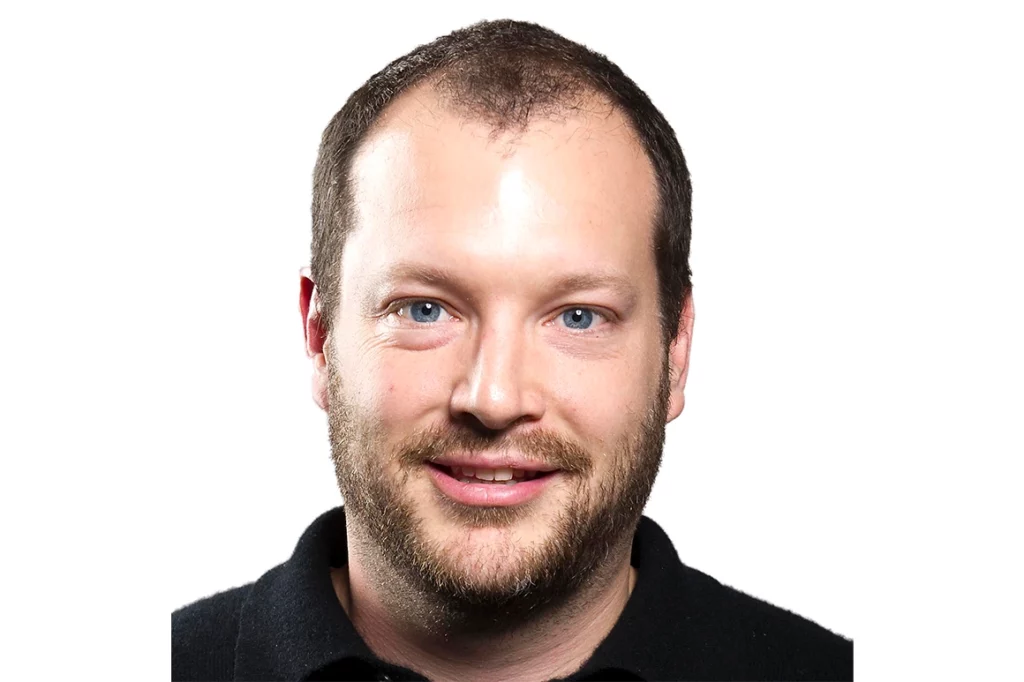
New York Times (“Blake Hounshell, ‘On Politics’ Editor at The Times, Dies at 44“):
Blake Hounshell, an influential political journalist who was managing editor of Foreign Policy magazine and a top editor at Politico before joining The New York Times and overseeing its popular newsletter “On Politics,” died on Tuesday in Washington. He was 44.
His family said in a statement that he had died “after a long and courageous battle with depression.” The police in Washington were investigating the death as a suicide, a police official said.
Mr. Hounshell, who joined The Times in 2021, wrote “On Politics” out of Washington, incorporating contributions from other Times correspondents. The newsletter appears five days a week and is regularly read by an estimated half-million paying subscribers.
Mr. Hounshell “quickly distinguished himself as our lead politics newsletter writer and a gifted observer of our country’s political scene,” Joseph Kahn, the Times’s executive editor, said in a memo to the staff, adding, “He became an indispensable and always insightful voice in the report during a busy election cycle.”
[…]
Born on Sept. 4, 1978, in California, Bernard Blakeman Hounshell was raised in Delaware and Pittsburgh. He graduated from Yale University with a bachelor’s degree in political science in 2002. He began his journalism career after studying Arabic in Cairo.
In 2011, he was a finalist for the Livingston Awards for Young Journalists, given by the Wallace House Center for Journalists at the University of Michigan, for his reporting on the Arab Spring uprisings of the early 2010s.
In his time as managing editor of Foreign Policy, from 2009 to 2013, the magazine won three National Magazine Awards as he transformed the publication for the internet era.
At Politico, where he worked for eight years before joining The Times, he was digital editorial director, managing editor for Washington and political news, managing editor, and editor in chief of the website’s magazine, which he had initiated.
He had been launching, writing and editing newsletters and blogs for 15 years since 2006, when he joined Foreign Policy.
David Halbfinger, The Times’s politics editor, said on Tuesday that Mr. Hounshell was endowed with “the kind of wide-ranging intellect that made it possible for him to explain anything to anyone.”
He is survived by his wife, Sandy Choi, and two children, David and Astrid. He lived in northwest Washington.
His friend and colleague Garrett M. Graff writes “In Remembrance of a Beloved and Very Online Journalist.”
The unexpected news spread rapidly through Washington and policy circles, as colleagues remembered him as a remarkable editor, generous colleague and critical mentor to younger journalists. Across his stints at Foreign Policy and POLITICO, he edited hundreds of bylines, from senior policymakers to interns, making every story sharper and every headline snappier.
[…]
Hounshell’s interest in international affairs and the Middle East led him online: He founded a foreign policy blog, called “American Footprints,” and wrote for the American Prospect’s blog in an era where Prospect hosted many of the nation’s hottest emerging voices, like Ezra Klein and Matthew Yglesias, and the site’s unique voice was helping to pioneer a new style of journalism in Washington, D.C.
With little journalism training and background, Hounshell wove and wrote his way into the field primarily by devouring news and hoovering up more information than anyone around him, eventually landing a role at Foreign Policy. In the wake of the magazine’s 2008 purchase by The Washington Post Company, incoming editor Susan Glasser remembers being immediately struck by Hounshell’s wide-ranging interests and unparalleled metabolism.
“He was faster and smarter and more immersed in the news cycle than anyone I’ve known,” Glasser recalled. “Although Blake wasn’t born with an iPhone in his hand, he was the first and most digital native person I knew.”
Working together, Glasser and Hounshell reinvented Foreign Policy, remaking the longtime print publication, which had been run by the Carnegie Endowment for 30 years, into a daily online magazine just as magazines were imagining a web-first future. David Kenner, whom Hounshell first hired as an intern and later into a staff role, recalls Hounshell’s voracious reading ability.
“He had his encyclopedic knowledge of the world that was unparalleled among our staff. At FP, his job was to oversee the whole world, really, and the joke was always that we’d have lunch with, like, a Swedish diplomat, and he’d be like, ‘I was reading this obscure Swedish document and had this very specific question’ — things that no one could fathom how someone who had such a broad remit could know,” Kenner recalls.
[…]
Hounshell succeeded in feeding his voluminous intellectual appetite in part by being brutally efficient in his emails — he and Kenner reached a point where Hounshell would reply to the writer’s long pitches just with a “Y” or an “N.” As Kenner recalls, “He was incredible — this multi-tasker who could answer all these questions and keep all these plates spinning.”
The reinvention of Foreign Policy was seen as a bright spot in an industry still struggling to come to terms with the impact of the internet, and won Glasser, Hounshell and the upstart magazine a digital National Magazine Award for its blogs. On the train ride back from New York to Washington, their Alexander Calder “Ellie” award awkwardly perched with them, Glasser recalled that Hounshell confided that his wife had been offered a professional opportunity in Qatar that would force him to leave the magazine. “In journalism people come and go, and I just couldn’t do it,” Glasser says, recalling that she told him he should keep his job in Qatar: “Somehow we’ll make it work.”
The timing proved fortuitous, as the Arab Spring broke out soon after his return to the Middle East, putting him at the center of one of the biggest stories in the world and in a region that had uniquely captured his heart. “He basically live-tweeted the whole thing,” Glasser recalled.
“It meant so much to him to throw himself back into a story — and specifically an Egyptian story. His Twitter feed was just nonstop, it was 20 hours a day — following the most minute details of the politics,” Kenner recalled. “It was one of the first times I’d ever seen it used like that.”
Hounshell’s Twitter following grew to hundreds of thousands, in an era when such followings were all-but-unheard of, but he was hardly only a keyboard journalist: He reported on-the-ground from Tahrir Square and experienced the uprising up-close; his reporting for Foreign Policy was a finalist for the Livingston Awards, the prestigious recognition for the best journalism by journalists under 35.
After Hounshell returned to Washington he and Glasser were recruited to POLITICO in 2013 to launch the brand’s first foray into longform journalism, a project that became POLITICO Magazine.
The magazine, which Glasser, as editor, and Hounshell, as deputy editor, launched in 2013 quickly established itself as a must-read, recognized as one of the industry’s hottest new magazines, scoring two National Magazine Award finalist nods in its first year, and both the Michael Kelly Award and the George Polk Award for its coverage of the rise of ISIS.
In their collaborative transformation of multiple agenda-setting publications, Glasser and Hounshell’s unique editorial partnership over a decade surely ranks as one of the capital’s deepest, one that helped forever remake the metabolism of Washington journalism and reshaped the industry’s understanding of digital magazines. As Glasser says, “He was not just a colleague, but my indispensable partner.”
[…]
Even as his stature in the newsroom rose, he feared that management would take him away from the world of ideas that he loved. He loved the craft and give-and-take of editing and preferred being in the editorial trenches with reporters, thinking about ledes, headlines and angles; when Donald Trump’s new administration issued its surprise so-called “Muslim Ban” on the first Friday of his presidency, Hounshell raced to Dulles Airport to cover the chaos, resulting in a first-person piece, “Scenes from a Constitutional Crisis,” that harkened back to his reporting on the Arab Spring.
As his colleague Charlie Mahtesian recalled, “His brilliance came to him at speed — the connections occurred to him immediately. He always understood what the story was right away. He was an idea factory. He did not have a sharp ideological edge, which left him open to every possible possibility.”
Elizabeth Ralph, the current editor of POLITICO Magazine whom Hounshell mentored for years, recalls, “Blake completely appreciated the unconventional. He was always encouraging me to go down weird rabbit holes and telling me to follow my curiosity. He hated conventionality — anything vanilla. And he wanted Impact, with a capital I.”
Glasser says, “He loved scoops; he loved news. He was great at headlines; he had a gift for framing and getting to the edge of the story and then getting beyond it.”
[…]
On Twitter in the wake of the news of Hounshell’s death Tuesday, Tim Alberta, a former POLITICO Magazine staff writer, shared how Hounshell had helped him early in his new job navigate a panic disorder that manifested in ferocious, debilitating anxiety so bad Alberta wasn’t sure he’d be able to continue writing. “His response was something I’ll never forget. ‘Want to compare notes?’ he asked me. So we did. My new boss, a dude I barely knew, became my mental-health confidante. We’d start every work-related conversation by trading stories about our respective struggles. I started to improve. And my new boss was a big reason why,” Alberta wrote. “Wouldn’t you know, we started churning out hits together at Politico Mag — some of the best work of my career. He never took any credit, but he deserved all of it. Because without him, without his patience and humanity and empathetic ear, I might have never reported again.”
A stroke just before the 2020 election led Hounshell himself to reconsider how to balance his passion for following the ins and outs of the daily news cycle, particularly as the father of young kids he adored and posted about regularly on Instagram. He took up exercising — an interest that quickly turned just as intense as his daily reading and eventually included a rock-climbing phase. “We would go to the gym together, and eventually stopped because he got so much more fit and ahead of me,” recalls Strauss, now a staff writer at the New Republic.
In 2021, he left POLITICO for the New York Times, where he returned to his early writing roots — helming the newspaper’s nightly “On Politics” newsletter. John Fetterman, the newly elected Pennsylvania senator who himself suffered a stroke mid-campaign last campaign, recalled on Twitter Tuesday how Hounshell brought his own life challenge into that daily column: “Blake Hounshell was a fellow stroke survivor, and one of the first interviews I did when I returned to the campaign trail and struggled to find my words. He showed compassion and humanity in a way few others had. This is heartbreaking.”
I was both shocked and saddened when I learned of Blake’s death via Twitter late yesterday afternoon. He retweeted an 8:54 AM post of his colleague Peter Baker and, not much later, apparently jumped from a bridge.
I don’t think we ever met but it seems like I’ve known him forever. The oldest OTB reference I could find was a November 2006 link to a post on Middle East politics he wrote while still at The Prospect. The most recent was a November 2022 piece poking fun at his analysis of Democratic efforts to dissuade sane Republicans from running for open Senate seats.
I contributed several pieces to Foreign Policy‘s online platform during his tenure but don’t recall directly interfacing with him on them. There’s no indication of having done so in my email inbox.
Blake’s Twitter feed was a must-read for those interested in foreign affairs or pretty much anything. He seemed always on, tweeting at a prodigious volume and with tremendous wit that was seldom mean-spirited.
I can’t imagine someone so successful, beloved professionally and personally, and with a seemingly happy family life committing suicide at 44. Much less leaving my wife and children behind to deal with the aftermath. But depression is a cruel disease, making the irrational seem like the only possible choice.

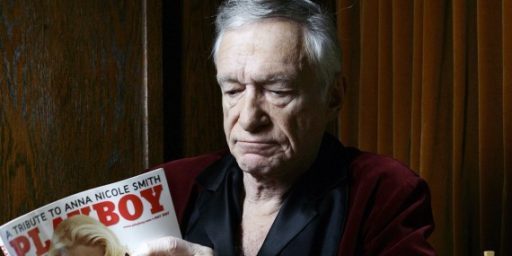
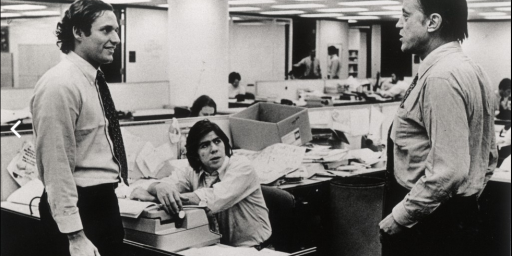
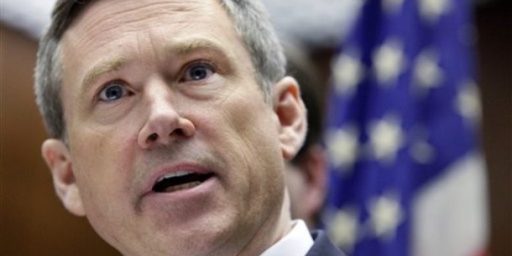
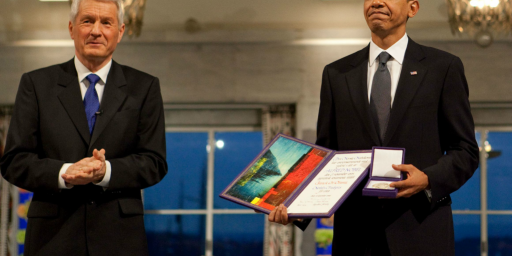

Oh….rather personl…. I knew him from my early blogging days, the era of Aqoul, when he was a kid.
Bugger.
The earliest reference I found to him at my place was from 2004.
It’s so sad. So much promise.
He fought a cruel and relentless enemy as best he could. My sympathies to his friends and family.
I met my friend John in ’71 0r ’72 when we were both in our mid twenties. We got to be drinking buddies. In the hot summer he discovered a bar that had Miller High Life on tap for 25¢. We spent alot of time there. When we didn’t have a lot of quarters to spare we would get 99¢ six packs of Grain Belt and the two of us would sit on the front porch of the house he lived in with his girlfriend who he had met in High School. He would play Neil Young songs and we would sing along.
Sometime in early ’73 they split up and moved to separate houses.
He did not take it well.
His ex told me that he threatened suicide and asked me if I thought he would do it. I told her no.
I remember sitting in a bar drinking with him when he said: “I’m going to kill myself.”
I laughed out loud. “You will not!”
A few days later he put the wrong end of his .22 rifle in his mouth and blew the back of his head off.
We buried him on Easter Sunday.
I can still hear the utter despair of his girlfriend as she cried out his name as she literally had to be pried from his casket at the graveyard.
It doesn’t take much on a warm summer night to hear him play the guitar and sing…
Old man look at my life,
I’m a lot like you were.
Old man look at my life,
I’m a lot like you were.
Old man look at my life,
Twenty four
and there’s so much more
Live alone in a paradise
That makes me think of two.
He never made it to 25
and now I’m the old man.
Not even sure it’s irrational. If the suffering is so bad you can’t see a way out, it seems scary rational.
We have much better treatment for depression than we did 30 years ago, but there’s still a lot of people who can’t be reached. (I’m assuming that if he battled depression for years that he was getting help)
I’m glad my screwed-up kid college-age depression seems to have settled into anxiety instead — it’s just annoying rather than awful.